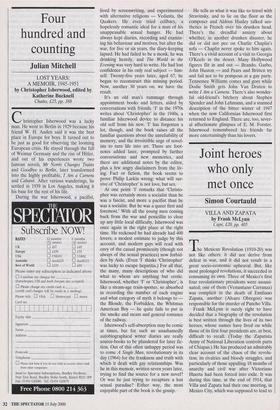Four hundred and counting
Julian Mitchell
LOST YEARS: A MEMOIR, 1945-1951 by Christopher Isherwood, edited by Katherine Bucknell Chatto, £25, pp. 388 Christopher Isherwood was a lucky man. He went to Berlin in 1929 because his friend W. H. Auden said it was the best place in Europe for boys. It turned out to be just as good for observing the looming European crisis. He stayed through the fall of Weimar Germany and the rise of Hitler, and out of his experiences wrote two famous novels, Mr Norris Changes Trains and Goodbye to Berlin, later transformed into the highly profitable, I Am a Camera and Cabaret. After various wanderings, he settled in 1939 in Los Angeles, making it his base for the rest of his life.
During the war Isherwood, a pacifist lived by screenwriting, and experimented with alternative religions — Vedanta, the Quakers. He even tried celibacy, a hopelessly romantic ideal for a man of his unappeasable sexual hunger. He had always kept diaries, recording and examin- ing his behaviour and motives, but after the war, for five or six years, the diary-keeping lapsed. He had failed to be a monk, he was drinking heavily, and The World in the Evening was very hard to write. He had lost confidence in his only real subject — him- self. Twenty-five years later, aged 67, he began to reconstruct this missing period. Now, another 30 years on, we have the result.
It's an old man's rummage through appointment books and letters, aided by. conversations with friends. 'I' in the 1970s writes about 'Christopher' in the 1940s, a familiar Isherwood device to distance his old self from his new. T has forgotten a lot, though, and the book raises all the familiar questions about the unreliability of memory, and the irresistible urge of novel- ists to turn life into art. There are foot- notes added later, prompted by further conversations and new memories, and there are additional notes by the editor, plus a few angry disclaimers from the liv- ing. Fact or fiction, the book seems to prove Philip Larkin wrong: what will sur- vive of 'Christopher' is not love, but sex.
At one point T remarks that 'Christo- pher was certainly more a socialist than he was a fascist, and more a pacifist than he was a socialist. But he was a queer first and foremost.' With all the young men coming back from the war and penicillin to clear up any little local difficulty, Isherwood was once again in the right place at the right time. He reckoned he had already had 400 lovers, a modest estimate to judge by this account, and modern gays will read with envy of the casual promiscuity (though not always of the sexual practices) now forbid- den by Aids. (Even T thinks 'Christopher' was lucky to escape hepatitis.) For all that, the many, many descriptions of who did what to whom are anything but erotic. Isherwood, whether 'I' or 'Christopher', is like a steam-age train-spotter, so absorbed in recording the number of each engine and what category of myth it belongs to — the Blonde, the Forbidden, the Whitman American Boy — he quite fails to put in the smoke and steam and general romance of the railway.
Isherwood's self-absorption may be comic at times, but for such an unashamedly autobiographical writer diaries are really source-books to be plundered for later fic- tion. Out of this often unhappy period was to come A Single Man, revolutionary in its day (1964) for the frankness and truth with which it dealt with gay relationships. Was he in this memoir, written seven years later, trying to find the source for a new novel? Or was he just trying to recapture a lost sexual paradise? Either way, the most enjoyable part of the book is the gossip. He tells us what it was like to travel with Stravinsky, and to lie on the floor as the composer and Aldous Huxley talked aes- thetics in French over his drunken head. There's the dreadful anxiety about whether, in another drunken disaster, he did or did not pee on Charlie Chaplin's sofa — Chaplin never spoke to him again. There's a vivid account of a visit to Georgia O'Keefe in the desert. Many Hollywood figures flit in and out — Brando, Garbo, John Huston — and Pears and Britten try and fail not to be pompous at a gay party. Tennessee Williams comes and goes while Dodie Smith gets John Van Druten to write I Am a Camera. There's also wonder- ful old-friend's bitchery about Stephen Spender and John Lehmann, and a stunned description of the bitter winter of 1947 when the now Californian Isherwood first returned to England. There are, too, sever- al affectionate glimpses of E. M. Forster. Isherwood remembered his friends far more entertainingly than his lovers.


























































 Previous page
Previous page